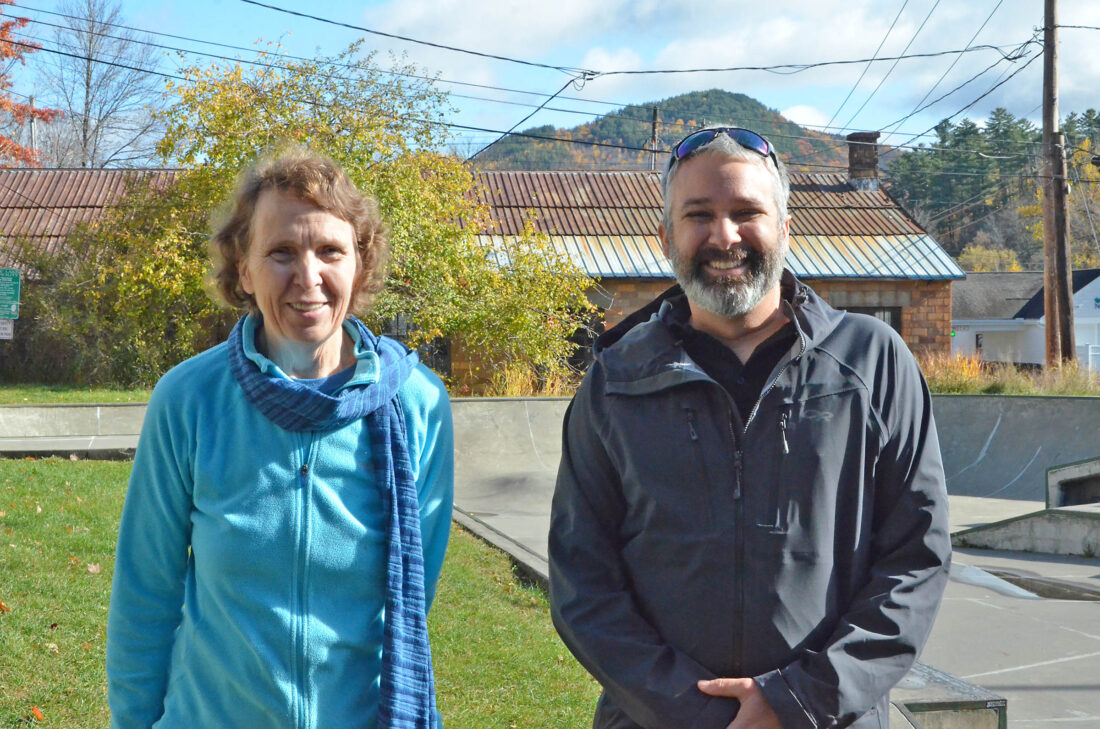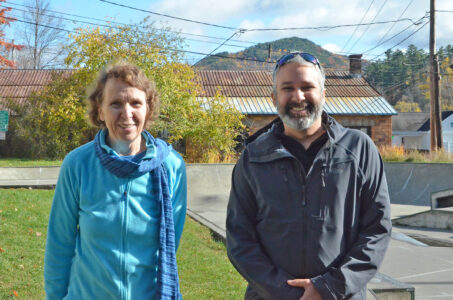Passing the torch
Ellis to leave county seat, Shoemaker running unopposed

Outgoing Franklin County District 7 Legislator Lindy Ellis, left, and Joe Shoemaker, who is running unopposed for the District 7 seat. (Enterprise photo — Aaron Marbone)
SARANAC LAKE — Franklin County Legislator Lindy Ellis is not running for reelection this year, after seven years in District 7 representing the towns of Harrietstown and Franklin. Saranac Laker Joe Shoemaker is running unopposed for the seat on the Democratic line.
Ellis said she knows she’s passing the position on to a good person and she’s glad Shoemaker stepped up.
Shoemaker said Ellis is leaving “pretty big shoes” to fill.
“Lindy is one of the hardest-working people in the county,” he said. “It would be a disservice to all of the hard work she’s put in to not be a really clean conduit moving forward.”
Shoemaker feels he’ll be entering a “well-oiled machine.”
He’s been getting to know the county employees and legislators. He’s liked all of them and feels they’re hard workers, too.
The county has an approximately $140 million budget and operates 26 departments that provide services to residents — highways, public health, economic development, real estate, courts and services for children, seniors and veterans.
In 2018, former legislator and current Adirondack Park Agency Executive Director Barb Rice was leaving her seat and asked Ellis to run. Ellis had never held an elected position, but Rice said they needed smart people on the board. Ellis said she enjoys solving problems.
Now, she’s trying to “condense” her three jobs. She also teaches manufacturing leadership at Corning Community College and organizes 74 coaches for Corning Inc. in Taiwan, China and the U.S. She’s creating a succession plan for those jobs, too.
Now that she’s stepping down, she plans to take a breath and bike the recently completed Adirondack Rail Trail more.
–
Shoemaker
– Shoemaker grew up in Michigan and spent almost five years in the Coast Guard out of high school, mostly in Alaska. He moved here 20 years ago and decided to stay. Two of his children have graduated from Saranac Lake High School and his youngest daughter is in middle school. His wife teaches at North Country Community College.
He has not held elected office before, but served on the Saranac Lake Area Chamber of Commerce for eight years before he aged out.
He owns Fathom, a recruiting company which works with some local organizations and mostly high-tech manufacturing startups.
“I help them build high-functioning teams to solve really complex problems,” Shoemaker said.
He feels he can do that in county government.
The legislature sounds cohesive, not partisan, but in “lock-step” with each other.
He said legislators cannot only focus on benefiting their towns. They are only one member and need a majority to get things passed. This requires a “give and take” to work together to get things done. Since there are only two legislators in the south end of the county, he said they need buy-in from the rest of the county to do things to benefit their towns.
Everyone should be looking out for their constituents, but also the county as a whole, he said.
–
Infrastructure, tourism and taxes
–
The Harrietstown-owned Adirondack Regional Airport is a big piece of infrastructure that Shoemaker feels the county should focus more on. The county invests money in Harrietstown, but he feels there needs to be a “paradigm shift” in how the airport is perceived. Shoemaker said the county usually appears more comfortable funding organizations and events that will eventually become self-sufficient. But he thinks the airport should be considered another piece of infrastructure — like highways — which the county should help maintain for its economic impact. He wants to take a deeper look at the return on investment the county could get from the airport.
Shoemaker said he’d like to focus on tourism. It’s an important department as a major industry for the North Country, which a lot of people depend on.
Now that the 34-mile rail trail connecting Lake Placid, Saranac Lake and Tupper Lake has been completed by the state, he said he wants to capitalize on it. He volunteers with local snowmobile groups and said it’s a billion-dollar industry in New York. The trail needs more signage to get people off the trail and into the communities to eat, shop and spend. He feels there’s a “missed opportunity” currently.
The county’s occupancy tax law, sometimes colloquially referred to as the “bed tax,” places a 5% tax on all rented rooms at hotels, motels, bed-and-breakfasts and vacation rentals, with that revenue to be spent on tourism promotion.
Shoemaker said there’s a sense in the south end of the county that money generated here is funneled away from Saranac Lake to other areas of the county. He doesn’t believe this sentiment is backed up with data, and thinks the perception is because of a communication and transparency issue on the side of the county.
“I think the money is staying in the community, we’re just not shouting from the rooftops about how much is being reinvested,” Shoemaker said. “If it’s not in the open, it’s suspect.”
There’s an overarching question of if the bed tax funds should return proportionally to regions that generate it, or be used to lift regions that don’t. It’s a challenging question, Shoemaker said.
It needs to invest in underdeveloped places, but also boost areas contributing to the fund, he felt.
Ellis said the hotel owners tell her that they would like more money spent on increasing reliable, year-round tourism instead of just single-weekend events.
The 2026 budget will already be passed when new legislators are sworn in in January. Shoemaker said he’d have a year to get to know the county finances before working on the next one.
He said he’ll bring an “unemotional” approach to budgeting, looking at tax dollars like they’re his own finances and asking himself, “Would I spend this?”
“The county is a business, and it is a service organization,” Shoemaker said. “We’re charging a service, which is your tax dollars. That’s the fee. What are you getting for your (return on investment)? What does that money do for you?”
For example, he said the highway department does a great job. It is “fully baked,” and consistent, he said. Ellis said the highway department is a core service, and always creates a schedule of highways to resurface each summer.
–
Broadband
–
One of Ellis’ focuses on the legislature has been building out broadband infrastructure to reach more homes. She spends hours a week on this project. Before doing an interview at the Enterprise offices earlier this week, she was taking a broadband meeting call in her car in the parking lot.
Shoemaker wants to help Ellis get this win because she’s been working on it for so long. It will be a big milestone for him, personally, too.
He said she knows a ton about broadband and he’s been catching up on it all.
“It’s a lot,” he said.
Ellis started working on broadband in 2020.
Since then, the number of unserved locations — houses with no broadband — has been cut in half countywide.
In 2020, 14% of homes in the county were unserved by broadband. Now, 7% are unserved. Another 7% are still considered underserved, which means they have only one source of internet.
The efforts have brought the number of homes without broadband in the town of Franklin from 57% to 27%.
Currently, the state ConectALL program is preparing to oversee the installation of miles and miles of fiber optics throughout Franklin County.
One project uses a $2.4 million federal grant to build 36 miles of fiber optics from Saranac Lake through Bloomingdale and out into Vermontville toward Redford, servicing more than 1,600 homes and businesses.
The other uses a $13 million federal grant to build 144 miles of fiber optics and five wireless towers in the towns across the northern border — Burke, Bombay, Chateaugay, Constable, Fort Covington and Westville — reaching more than 1,500 homes and businesses.
Ellis said these two projects try to reach the most underserved areas in the county. There are still even more locations, but she said they might need to use different technology to reach them.
–
Service
–
Being a legislator is not always about voting on resolutions or passing budgets. Ellis said it’s a lot of constituent services and helping individuals in need — linking them up with the 26 county departments that provide services.
She recalls a man calling her from out of state to tell her his 92-year-old father needed to go to the doctor, but his caregiver was injured and couldn’t. She reached out to the community and the first person she called took the man to his appointment.
Another elderly man living in a rural area of the county called her to say he couldn’t drive anymore, but needed to be able to get to the grocery store for his meals. She hooked him up with the Office for Aging’s Meals on Wheels program.
Then, there are larger-scale services legislators provide.
During the coronavirus pandemic she coordinated vaccination clinics and organized five food giveaways with a Republican legislator — two in Franklin and three in Harrietstown — distributing tens of thousands of pounds of milk, produce and dairy products.
On top of passing resolutions and getting grants, Ellis said legislators’ jobs include talking to people in the state and federal government to get resources, advocate for or against actions by these larger governments and tell them of local needs.
The legislators passed a resolution pushing back on state electrification for department of public works fleets and buses. Ellis said she drives an electric vehicle herself, but she doesn’t think that would work for work vehicles.
As the county has been creating its budget this year, Ellis said there’s been uncertainty on if the usual federal money will come in. The county is preparing to minimize that impact, if it doesn’t, she said. She said they’ve been cutting positions by attrition, being cautious with taxpayer money and identifying at-risk areas if funding is lost.
Ellis said 50% of the county budget goes into social services — offices that help a lot of people, especially children.
On Nov. 6, the legislature will hold a public meeting on the proposed $142 million budget at the Harrietstown Town Hall at 2 p.m.
After that, they plan to pass a resolution allowing them to exceed the state-imposed tax cap. Ellis said they’re not expecting to exceed the tax cap — it’s been flat for five years, even during the pandemic — but she said anything could happen, and the county needs to be prepared if it does.
–
Housing
–
Every conversation about how to move the county forward comes back to the lack of affordable housing, Shoemaker said. It’s a “major challenge.” There’s not a lot of room to develop land. The Adirondacks’ allure is that it isn’t over-developed.
Shoemaker is a fan of the county land bank which gets properties that have years of delinquent taxes and are run-down or vacant from the county, renovates them with state grants and private money and sells them to private people for housing or commercial use. It is not scaled for major development, but is a great start, he feels.
The program increases the taxable value of towns, restores houses no one else wants to buy and is what he considers a “sound investment of tax dollars.”
Ellis has had her eye on replicating the HomeShare Vermont nonprofit model for a while now. HomeShare pairs people who have homes with extra rooms with people looking for a small place to live. Many houses that used to have five people living in them now have two, she said. These people — often older people — want to stay in their homes, but need help doing chores.
HomeShare does background checks, interviews and a week-long trial to make sure they are making good, safe matches and to make sure the elderly are not taken advantage of.
People already rent out portions of their homes, Ellis said. She’d like locals to make it more official and set up a safety system. Shoemaker said he’s interested in this program, too.
Sometimes, it’s the county holding back on things that helps.
During the pandemic, when people lost their incomes and were worried about their homes being foreclosed on, Ellis said county Treasurer Fran Perry established an amnesty period, allowing them to pay their back taxes, but not need to pay the additional county fees the county puts on these taxes.
Ellis said 650 families used it. They kept their homes and the county still brought in tax revenue.
She said she’ll miss the county staff, and said they’re “excellent people” who are always thinking of the communities.
Ellis will serve until the end of 2025.
Early voting starts today and election day is on Nov. 4. For more election information, go to tinyurl.com/mryjzn27.





